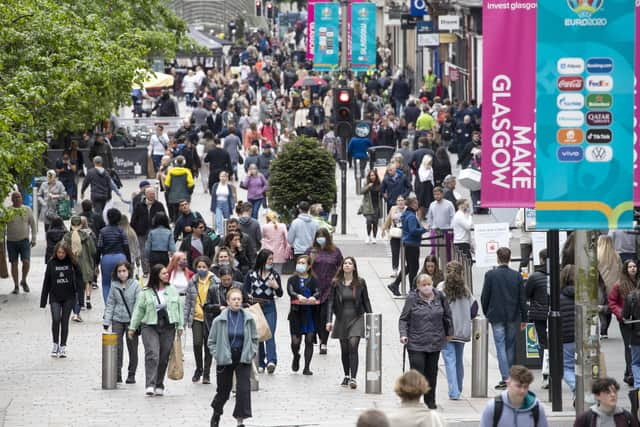December sales slump as Omicron spread rocks UK high street: reaction
The Office for National Statistics (ONS) said sales fell 3.7 per cent in December - the biggest monthly fall since January 2021 - compared to a rise of 1 per cent in November.
Officials also suggested the fall was due to shoppers getting their gift-buying done earlier in November to avoid disappointment due to supply chain disruption.
Advertisement
Hide AdAdvertisement
Hide AdNon-food stores took some of the hardest hits, with volumes dropping 7.1 per cent across department stores, clothes outlets and homewares businesses.


There was a 4.7 per cent drop in fuel sales last month, as restrictions saw a return to work-from-home rules and fewer people travelled as Omicron led to large numbers of households self-isolating.
Food stores sales fell by 1 per cent, although they remained 2 per cent above pre-pandemic levels.
Data showed the number of shoppers heading to physical stores was below normal expectations for the busy festive period, with the ONS pointing out that footfall levels were 81 per cent of the levels seen in the week leading up to Christmas 2019.
By comparison, the proportion of online sales rose slightly in the month from 26.3 per cent of total sales in November to 26.6 per cent in December.
ONS deputy director for surveys and economic indicators Heather Bovill said: “After strong pre-Christmas trading in November, retail sales fell across the board in December, with feedback from retailers suggesting Omicron impacted on footfall.
“However, despite the fall in December, retail sales are still stronger than before the pandemic, with over a quarter of sales now made online.”
Euan Murray, relationship director and retail sector expert at Barclays Corporate Banking, Scotland, said: “The last month of 2021 felt very different to December of the year before, with people allowed to gather and celebrate with the easing of Covid restrictions.
Advertisement
Hide AdAdvertisement
Hide Ad“This increased freedom helped drive spend in some areas of retail, with festive food and drink performing well in Scotland. Sales of health and sports equipment were also strong as people sought to kit out ahead of their New Year’s resolutions.
“Electrical sales saw a noticeable drop in December, as supply chain issues impacted on cost and availability.
“Many people had also already invested heavily in home entertainment during the previous months of lockdown, which further impacted on consumer demand for electrical goods.”
Helen Dickinson, chief executive of the British Retail Consortium, said: “The spread of Omicron may have slowed Christmas spending, but the perseverance of retailers helped deliver a successful Christmas for consumers.
“Customers face strong headwinds in 2022, with energy prices and National Insurance contributions both set to rise.”
Sam Miley, senior economist at CEBR, added: “Retail sales volumes contracted sharply in December, as the emergence of the Omicron variant impacted consumer behaviour. These effects are expected to subside, however, given the recent fall in case numbers and changes to policy guidance.”
A message from the Editor:
Thank you for reading this article. We’re more reliant on your support than ever as the shift in consumer habits brought about by coronavirus impacts our advertisers. If you haven’t already, please consider supporting our trusted, fact-checked journalism by taking out a digital subscription: www.scotsman.com/subscriptions
Comments
Want to join the conversation? Please or to comment on this article.
